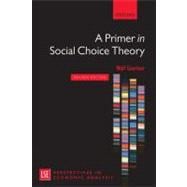
Note: Supplemental materials are not guaranteed with Rental or Used book purchases.
Purchase Benefits
What is included with this book?
| Preface to the Revised Edition | p. vii |
| Preface and Acknowledgements to the First Edition | p. viii |
| About the Author | p. xiii |
| Introduction | p. 1 |
| Basic questions | p. 1 |
| Catching a glimpse of the past | p. 3 |
| Basic formalism | p. 6 |
| Aggregation of preferences - how can this be done? | p. 9 |
| The informational aspect | p. 12 |
| A path through haze, or how to read this book | p. 14 |
| Some exercises | p. 16 |
| Arrow's impossibility result | p. 19 |
| The axiom system and the theorem | p. 19 |
| The original proof | p. 21 |
| A second proof | p. 25 |
| A third diagrammatic proof | p. 28 |
| A short summary | p. 34 |
| Some exercises | p. 34 |
| Majority decision under restricted domains | p. 37 |
| The simple majority rule | p. 37 |
| Single-peaked preferences | p. 43 |
| Other domain conditions: qualitative and quantitative | p. 49 |
| A short summary | p. 53 |
| Some exercises | p. 53 |
| Individual rights | p. 57 |
| Sen's impossibility of a Paretian liberal | p. 57 |
| Gibbard's theory of alienable rights | p. 59 |
| Conditional and unconditional preferences | p. 62 |
| Conditional and unconditional preferences again: matching pennies and the prisoners' dilemma | p. 64 |
| The game form approach to rights | p. 66 |
| A short summary | p. 70 |
| Some exercises | p. 71 |
| Manipulability | p. 75 |
| The underlying problem | p. 75 |
| The Gibbard-Satterthwaite theorem | p. 80 |
| Strategy-proofness and restricted domains | p. 85 |
| A short summary | p. 92 |
| Some exercises | p. 93 |
| Escaping impossibilities: social choice rules | p. 97 |
| The Pareto-extension rule and veto power | p. 97 |
| Scoring functions and the Borda rule | p. 102 |
| Other social choice rules | p. 109 |
| A parliamentary vote: Berlin vs. Bonn | p. 114 |
| A short summary | p. 117 |
| Some exercises | p. 117 |
| Distributive justice: Rawlsian and utilitarian rules | p. 121 |
| The philosophical background | p. 121 |
| The informational structure | p. 122 |
| Axioms and characterizations | p. 124 |
| Diagrammatic proofs again | p. 129 |
| Harsanyi's utilitarianism | p. 134 |
| A short summary | p. 136 |
| Some exercises | p. 137 |
| Cooperative bargaining | p. 139 |
| The bargaining problem | p. 139 |
| Nash's bargaining solution | p. 140 |
| Zeuthen's principle of alternating concessions | p. 148 |
| The Kalai-Smorodinsky bargaining solution | p. 151 |
| A philosopher's view | p. 155 |
| Kalai's egalitarian solution | p. 157 |
| A short summary | p. 159 |
| Some exercises | p. 160 |
| Empirical social choice | p. 163 |
| Theory and opinions of the general public | p. 163 |
| Needs vs. tastes - the approach by Yaari and Bar-Hillel | p. 164 |
| Rawls's equity axiom - how does it fare? | p. 171 |
| From here to where? | p. 177 |
| A short summary | p. 179 |
| Some exercises | p. 179 |
| A few steps beyond | p. 181 |
| Social choice rules in continuous space | p. 181 |
| The uniform rule | p. 187 |
| Freedom of choice | p. 192 |
| An epilogue instead of a summary | p. 199 |
| References | p. 201 |
| Hints to the Exercises | p. 209 |
| Author Index | p. 213 |
| Subject Index | p. 215 |
| Table of Contents provided by Ingram. All Rights Reserved. |
The New copy of this book will include any supplemental materials advertised. Please check the title of the book to determine if it should include any access cards, study guides, lab manuals, CDs, etc.
The Used, Rental and eBook copies of this book are not guaranteed to include any supplemental materials. Typically, only the book itself is included. This is true even if the title states it includes any access cards, study guides, lab manuals, CDs, etc.